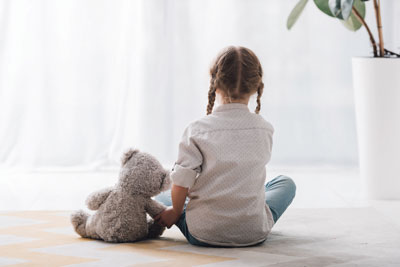
by Hayley Garner
NSPCC Local Campaigns Manager
For parents and carers, the summer months can be a tricky time as they try to balance the school holidays with work and childcare commitments. Many might be wondering whether their child is ready to be left unsupervised, or may have concerns about someone else’s child being left alone.
While there is no legal age a child can be left home alone, it is against the law to leave a child alone if it puts them at risk. Every child matures differently, so it would be impossible to have a ‘one size fits all’ law.
As a general rule babies and toddlers should never be left alone. This applies not just to leaving them home alone but also in your car while you run into the shops.
A very young child or one who does not feel comfortable should never be left home alone.
We would also recommend against leaving children under 12 alone, particularly for long periods of time. Children aged six to 12 years are usually too young to walk home from school alone, babysit or cook for themselves without adult supervision. It is worth considering leaving them at a friend’s house, with family or finding suitable childcare.
Once your child is at secondary school you could talk to them about how they would feel if they were left alone at home. Whether they are 12 years old or almost 18, there might be reasons they don’t feel safe in the house alone, and it is vital they feel comfortable and safe being left unsupervised.
If your child feels ready to be left at home alone, there are some simple things you can do to help keep them safe.
Set some grounds rules Make sure they know what to do if the phone or doorbell rings. Write down all your contact numbers and the numbers of friends and family in case you can’t be reached. Agree in advance if friends are allowed over.
Practise what to do in an emergency
Even though it is unlikely it is best to prepare for anything that might go wrong while you are out. Come up with a safety plan for different scenarios, such as a fire or burglary.
Make sure they are really safe online
Consider if there are any games or sites they might have access to while you are out that might upset them or put them in danger. Discuss what they are allowed to do while you are out and remind them not to give out any personal details online. More information on staying safe online can be found on the NSPCC website – www.nspcc.org.uk
Be clear about when you will be back
Make sure they are clear about what time you will be back and how you will let them know if your plans change.
Check in with them
Give your child a call every so often. If it is the first time they have been left alone, try to check in regularly. Even if your child is older and has been left home alone before, you should still check in once every few hours, particularly if you are out late.
Build up slowly
Leave them for a short time at first, no more than 20 minutes, then build up over time and keep checking in to make sure they are comfortable. Being left home alone for an hour is very different to being alone for a whole afternoon or overnight. We would not recommend leaving your child home alone overnight if they are under 16 years old.
You can find more advice on how to keep your child safe on the NSPCC website – www.nspcc.org.uk. Children can find support at www.childline.org.uk or by calling 0800 1111 and speaking to a trained Childline counsellor.
Adults with concerns about a child can contact the NSPCC Helpline by calling 0808 800 5000 or by emailing help@NSPCC.org.uk











